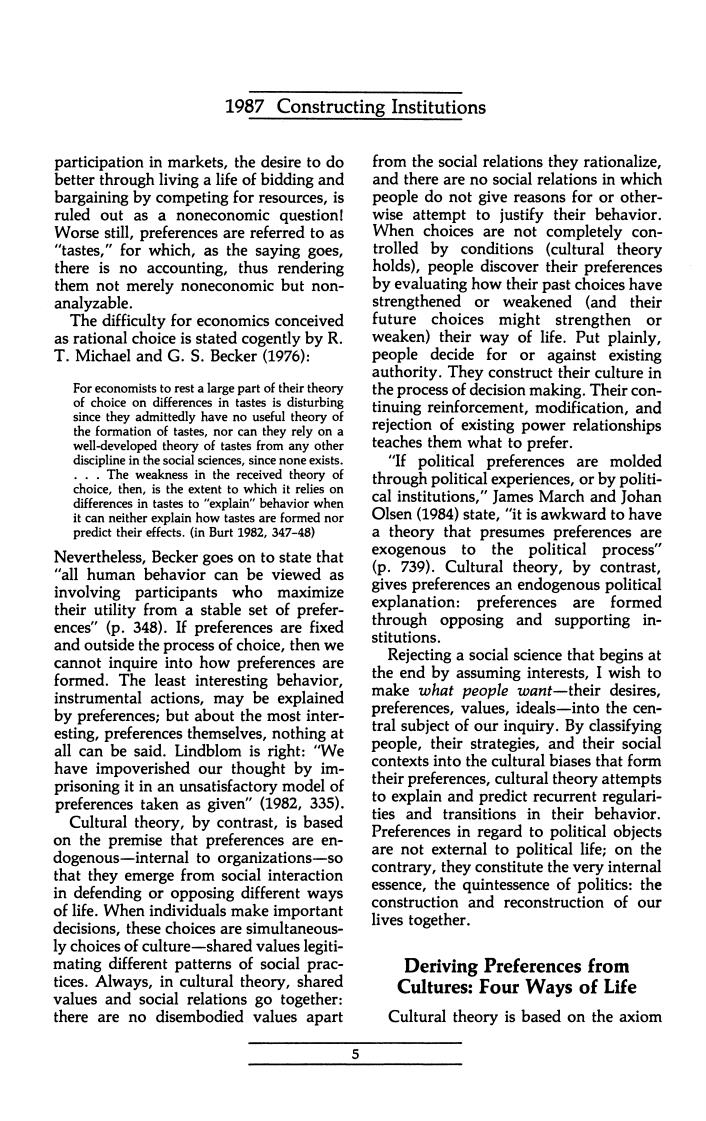正在加载图片...

1987 Constructing Institutions participation in markets,the desire to do from the social relations they rationalize, better through living a life of bidding and and there are no social relations in which bargaining by competing for resources,is people do not give reasons for or other- ruled out as a noneconomic question! wise attempt to justify their behavior. Worse still,preferences are referred to as When choices are not completely con- "tastes,"for which,as the saying goes, trolled by conditions (cultural theory there is no accounting,thus rendering holds),people discover their preferences them not merely noneconomic but non- by evaluating how their past choices have analyzable. strengthened or weakened (and their The difficulty for economics conceived future choices might strengthen or as rational choice is stated cogently by R. weaken)their way of life.Put plainly, T.Michael and G.S.Becker(1976): people decide for or against existing authority.They construct their culture in For economists to rest a large part of their theory the process of decision making.Their con- of choice on differences in tastes is disturbing tinuing reinforcement,modification,and since they admittedly have no useful theory of the formation of tastes,nor can they rely on a rejection of existing power relationships well-developed theory of tastes from any other teaches them what to prefer. discipline in the social sciences,since none exists. "If political preferences are molded ..The weakness in the received theory of through political experiences,or by politi- choice,then,is the extent to which it relies on differences in tastes to "explain"behavior when cal institutions,"James March and Johan it can neither explain how tastes are formed nor Olsen(1984)state,"it is awkward to have predict their effects.(in Burt 1982,347-48) a theory that presumes preferences are Nevertheless,Becker goes on to state that exogenous to the political process' "all human behavior can be viewed as (p.739).Cultural theory,by contrast, involving participants who maximize gives preferences an endogenous political their utility from a stable set of prefer- explanation:preferences are formed ences"(p.348).If preferences are fixed through opposing and supporting in- and outside the process of choice,then we stitutions. cannot inquire into how preferences are Rejecting a social science that begins at formed.The least interesting behavior, the end by assuming interests,I wish to instrumental actions,may be explained make what people want-their desires, by preferences;but about the most inter- preferences,values,ideals-into the cen- esting,preferences themselves,nothing at tral subject of our inquiry.By classifying all can be said.Lindblom is right:"We people,their strategies,and their social have impoverished our thought by im- contexts into the cultural biases that form prisoning it in an unsatisfactory model of their preferences,cultural theory attempts preferences taken as given"(1982,335). to explain and predict recurrent regulari- Cultural theory,by contrast,is based ties and transitions in their behavior. on the premise that preferences are en- Preferences in regard to political objects dogenous-internal to organizations-so are not external to political life;on the that they emerge from social interaction contrary,they constitute the very internal in defending or opposing different ways essence,the quintessence of politics:the of life.When individuals make important construction and reconstruction of our decisions,these choices are simultaneous- lives together. ly choices of culture-shared values legiti- mating different patterns of social prac- Deriving Preferences from tices.Always,in cultural theory,shared values and social relations go together: Cultures:Four Ways of Life there are no disembodied values apart Cultural theory is based on the axiom 5